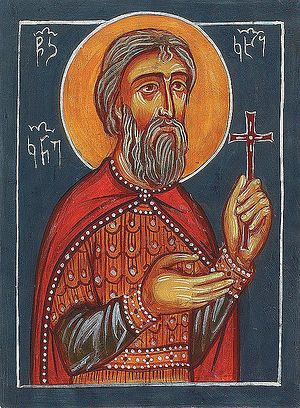The 9th century was one of the most difficult periods in Georgian history. The Arab Muslims wreaked havoc throughout the region of Kartli, forcibly converting many to Islam with fire and the sword. Many of the destitute and frightened were tempted to betray the Faith of their fathers.
At that time the valorous aristocrat and faithful Christian, Prince Constantine, was living in Kartli. He was the descendant of Kakhetian princes, hence his title “Kakhi.”
As is meet for a Christian believer, St. Constantine considered himself the greatest of sinners and often said, “There can be no forgiveness of my sins, except through the spilling of my blood for the sake of Him Who shed His innocent blood for us!”
While on a pilgrimage to the holy places of Jerusalem, Constantine distributed generous gifts to the churches, visited the wilderness of the Jordan, received blessings from the holy fathers, and returned to his motherland filled with inner joy. After that time Constantine would send thirty thousand pieces of silver to Jerusalem each year.
In the years 853 to 854, when the Arab Muslims invaded Georgia under the command of Buga-Turk, the eighty-five-year-old Prince Constantine commanded the army of Kartli with his son Tarkhuj.
Outside the city of Gori an uneven battle took place between the Arabs and the Georgians. Despite their fierce resistance, the Georgians suffered defeat, and Constantine and Tarkhuj were taken captive.
The captive Constantine-Kakhi was sent to Samarra (a city in central Iraq) to the caliph Ja’far al Mutawakkil (847-861). Ja’far was well aware of the enormous respect Constantine-Kakhi received from the Georgians and all the Christian people who knew him. Having received him with honor, he proposed that Constantine renounce the Christian Faith and threatened him with death in the case of his refusal. Strengthened by divine grace, the courageous prince fearlessly answered, “Your sword does not frighten me. I am afraid of Him Who can destroy my soul and body and Who has the power to resurrect and to kill, for He is the true God, the almighty Sovereign, Ruler of the world, and Father unto all ages!”
The enraged caliph ordered the beheading of St. Constantine-Kakhi. Bowing on his knees, the holy martyr lifted up a final prayer to the Lord. St. Constantine-Kakhi was martyred on November 10, 852, the day on which Great-martyr George is commemorated. The holy martyr’s body was hung from a high pillar to intimidate the Christian believers, but after some time it was buried.
A few years later a group of faithful Georgians translated St. Constantine’s holy relics to his motherland and reburied them there with great honor. In that same century the Georgian Orthodox Church numbered Prince Constantine-Kakhi of Kartli among the saints.
Troparion — Tone 4
Your holy martyr Constantine, O Lord, / Through his sufferings has received an incorruptible crown from You, our God. / For having Your strength, he laid low his adversaries, / And shattered the powerless boldness of demons. / Through his intercessions, save our souls!

